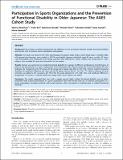Participation in Sports Organizations and the Prevention of Functional Disability in Older Japanese: The AGES Cohort Study

View/
Author
Kanamori, Satoru
Kai, Yuko
Kondo, Katsunori
Hirai, Hiroshi
Ichida, Yukinobu
Suzuki, Kayo
Published Version
https://doi.org/10.1371/journal.pone.0051061Metadata
Show full item recordCitation
Kanamori, Satoru, Yuko Kai, Katsunori Kondo, Hiroshi Hirai, Yukinobu Ichida, Kayo Suzuki, and Ichiro Kawachi. 2012. Participation in sports organizations and the prevention of functional disability in older Japanese: the AGES cohort study. PLoS ONE 7(11): e51061.Abstract
Background: We sought to examine prospectively the difference in the association between incident functional disability and exercise with or without sports organization participation. Methods: The study was based on the Aichi Gerontological Evaluation Study (AGES) Cohort Study data. In October 2003, self-reported questionnaires were mailed to 29,374 non-disabled Japanese individuals aged 65 years or older. Of these, 13,310 individuals were introduced to the Study, and they were followed for 4 years. Analysis was carried out on 11,581 subjects who provided all necessary information for the analysis. Results: Analysis was carried out on incident functional disability by 4 groups of different combinations of performance of exercise and participation in a sports organization Active Participant (AP), Exercise Alone (EA), Passive Participant (PP) and Sedentary (S). Compared to the AP group, the EA group had a hazard ratio (HR) of 1.29 (1.02–1.64) for incident functional disability. No significant difference was seen with the PP group, with an HR of 1.16 (0.76–1.77). When a measure of social networks was added to the covariates, the HR of the EA group dropped to 1.27 (1.00–1.61), and significant differences disappeared. In contrast, it showed hardly any change when social support was added. Conclusion: The results suggested that, even with a regular exercise habit, incident functional disability may be better prevented when a person participates in a sports organization than when he/she does not. In addition, participation in a sports organization correlates positively with social networks, which may lead to a small decrease in incident functional disability.Other Sources
http://www.ncbi.nlm.nih.gov/pmc/articles/PMC3511372/pdf/Terms of Use
This article is made available under the terms and conditions applicable to Other Posted Material, as set forth at http://nrs.harvard.edu/urn-3:HUL.InstRepos:dash.current.terms-of-use#LAACitable link to this page
http://nrs.harvard.edu/urn-3:HUL.InstRepos:10582122
Collections
- SPH Scholarly Articles [6362]
Contact administrator regarding this item (to report mistakes or request changes)


